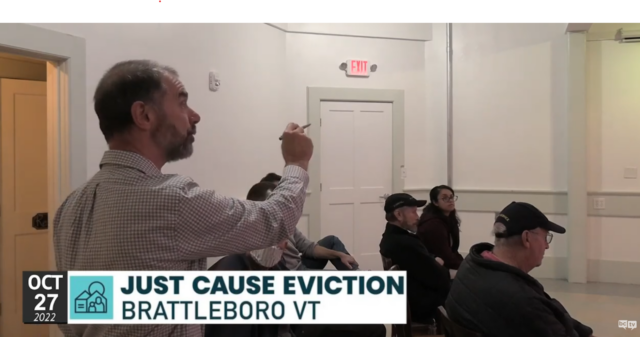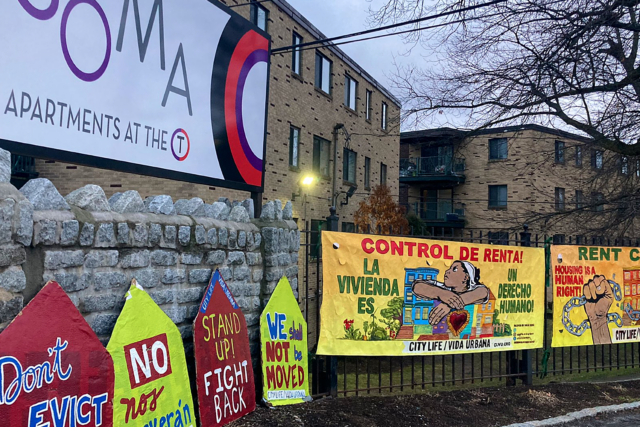Many landlords would like to keep the current system. Angela Zaikowski, Director of the Vermont Landlords Association, testified against Burlington’s charter change at the legislature because the charter “represents such a significant departure from our current state law” and because it will “take the system out of balance.” The Vermont Association of Realtors spent more than $40,000 opposing the just cause eviction campaign in Burlington in 2021. When Burlington voters nonetheless overwhelmingly supported the just-cause eviction ordinance (63% to 37%), the Realtors Association did not stop its advocacy. Peter Tucker, a paid lobbyist for the association, testified against the charter change when it came before the legislature as well.
In Vermont, where only around thirty percent of residents are renters, campaigns for tenant protections need to sway homeowners to support the provisions. Vermont’s Tax Department does not report what percent of tax filers filed “Landlord Certificates”, but nationally less than 7% of all individual filers reported rental income on their taxes in 2018. Senator Vyhovsky shared that homeowners, as a group, have not “come out loudly one way or the other.” Some supported the measure, “having remembered what it was like to be a renter,” but others expressed that they thought the measure “seems abrasive to landlords.”
In Brattleboro, where landlords led a campaign against the just-cause eviction measure, the measure failed. Per Proctor, the campaign was “out-organized” by the landlords. “We just couldn’t compete against the big money that landlords were willing to throw against it.” Brattleboro landlords were organized in their opposition by property manager and Realtor Sally Fegley. There were no campaign expenditures reported in the Vermont campaign finance data tracking system, but Fegley told Brattleboro Commons that the whole campaign cost less than $350, below Vermont’s requirements for reporting campaign contributions.
Per Fegley, the charter change in Brattleboro failed because people are afraid of crime, and local landlords campaigned on how eliminating no-cause eviction would empower drug dealers. Many different op-eds by landlords in local newspaper The Commons repeated and reiterated their argument that no-cause eviction is needed to remove “dealers and tenants who create problems on their property.” Just-cause advocates’ explanations that criminal or violent activity would provide “just cause” for eviction seemed to make little difference. The Brattleboro landlord advocates also insisted on their middle-class bona-fides.

Screen shot from Brattleboro Just Cause Eviction Community Information Meeting on October 27, 2022.
“We’re not conglomerates, we’re not corporate. We’re Brattleboro people, middle-class people trying to make a living,” said Fegley. But Fegley co-owns Windham Property Management with her husband, managing over 240 residential and commercial units.
“There is a distinction within landlords – there’s your small family landlord, the person who owns a duplex and rents out one half – versus the person who owns like six multi unit buildings. We saw pretty significant differences there.”
Sen. Vyhovksy saw a significant difference between how larger and smaller landlords reacted to the just-cause eviction campaign. “There is a distinction within landlords – there’s your small family landlord, the person who owns a duplex and rents out one half – versus the person who owns like six multi unit buildings. We saw pretty significant differences there.” Big corporate landlords and the Landlord Association completely opposed just-cause eviction at the legislature, but testimony from smaller landlords in support of the measure was very powerful.
For example, a property management company that manages over 50 units asserted that “no cause eviction of bad tenants greatly improves the quality of life of many others – neighboring tenants that may have been victimized by noise, overcrowding, and criminal activity” and described landlords as “‘gatekeepers’ that help establish and preserve good community behavior.” This same basic argument – that landlords protect other tenants using no-cause eviction of bad tenants – was repeated by the Vermont Association of Realtors in legislative testimony. But Sen. Vyhovsky called this argument disingenuous. “That’s not how I’ve seen landlords respond when someone complains about a tenant issue or a neighbor issue.”
Smaller landlords brought a different perspective. One landlord who owns a duplex in Burlington responded to other landlords’ complaints: “I fail to understand what responsible landlords who run their property in a business‐like manner are afraid of.” He continued, “I ask my fellow landlords to please stop. This is not the end of the world. If you run your property in a business‐like manner, screen well and keep your property in good shape, you will be rewarded by long‐term, stable and grateful tenants.”
Ultimately, the campaign for just cause eviction is about protecting tenants’ stability and security. As Rep. Kornheiser explained in Brattleboro, just cause eviction “recreates power dynamics that are much safer for people to live in diverse communities.” Landlord-tenant relations are governed by rules. As the Director of the Vermont Landlords Association testified, landlords “follow a process that has been prescribed to them by the legislature and court system.” Under the existing set of rules, landlords are empowered to “get rid of tenants who are annoying.” A different set of rules would lead to a different result.
As one astute tenant noted in Burlington, the reality is that people who landlords want to evict are “anyone who they don’t like. This is the trans person, the Black person, the person who works nights and comes home early and makes a bit of noise in the stairs, the person with mental health obstacles, the person who can’t afford a $100/month rent raise. Without [just cause eviction], the power lies with the landlord to decide if those people are good enough to deserve their housing.”
* Any name marked with an asterisk is a false name to protect the person’s identity. In light of their experiences without the protection of just cause eviction, these tenants were concerned with their landlords’ reaction to them speaking on the record.




![[F]law School Episode 7: Profit Over People](https://theflaw.org/wp-content/uploads/2024/11/Housing-Podcast-Episode-hero-image-640x427.webp)






